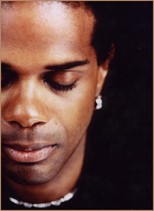| B i o g r a p h y |
 You can't ignore Andru Donalds:
the Jamaican is almost two meters tall (6 foot something), trim and
athletic. Most obvious characteristics are his long dreads - almost
notorious for any man from the Caribbean island. But that's it,
cliché-wise. In contrast to most if his countrymen, Andru
Donalds is not only about Reggae and Rastafari mythology. This is
easily explained by the experiences of his childhood and youth. "My
father was a professor of theology and psychology and the campus used
to be my playground. We traveled a lot, too. My dad worked at the
Princeton University, in Atlanta, Ga., London and in New York City." As
a kid, Andru Donalds saw a lot of the world. His musical development
was moulded by the most different influences. In this respect, too, his
father played an important role. "As a child, I was taught classical
music and I sang in a boys' choir. My dad gave me many records, some of
them Beatles records. The Beatles were my first excursion into the
realm of Rock and Pop music." While his father wished for his son to
take up an academic career, Andru Donalds didn't really find the
thought so attractive and after finishing school he left home.
You can't ignore Andru Donalds:
the Jamaican is almost two meters tall (6 foot something), trim and
athletic. Most obvious characteristics are his long dreads - almost
notorious for any man from the Caribbean island. But that's it,
cliché-wise. In contrast to most if his countrymen, Andru
Donalds is not only about Reggae and Rastafari mythology. This is
easily explained by the experiences of his childhood and youth. "My
father was a professor of theology and psychology and the campus used
to be my playground. We traveled a lot, too. My dad worked at the
Princeton University, in Atlanta, Ga., London and in New York City." As
a kid, Andru Donalds saw a lot of the world. His musical development
was moulded by the most different influences. In this respect, too, his
father played an important role. "As a child, I was taught classical
music and I sang in a boys' choir. My dad gave me many records, some of
them Beatles records. The Beatles were my first excursion into the
realm of Rock and Pop music." While his father wished for his son to
take up an academic career, Andru Donalds didn't really find the
thought so attractive and after finishing school he left home.
He spent some time in England, Holland and France trying to make it as a musician. But for many years it didn't quite seem to work. Andru Donalds had already been thinking of giving up music and going back to Jamaica, when renowned producer Eric Foster-White (Whitney Hoston, Hi Five, Britney Spears) offered him a contract. The result was his very successful debut album "Andru Donalds", released in 1995. The super-relaxed hit single "Mishale" climbed the US charts up to number four. And in Europe and the Far East, too, "Mishale" clung fast to the charts for a long time. His ambition to create "universal World Pop" - as Donalds calls his music - of great diversity and full of atmopshere, turned out to be right and successful. He slowed down for his second album, though. "With this album, I wanted to show my personal development, not just come up with another "Mishale". It's like with movies, the follow-up is never as good as the original." In 1998, "Damned If I Don't" was released. Shortly after the release, Andru Donalds got a call from producer Michael Cretu (Enigma). "He was on vacation in Greece and had heard "Mishale" and wanted me to sing on his Enigma project", Andru Donalds remembers, "at first, I was a little surprised but then I said to myself, why not." Donalds and Cretu met and both realized quickly that they'd get along very well.
The work on the Enigma project was postponed, because Michael
offered Andru to produce a complete album with him. Andru Donalds is
greatly impressed by his cooperation with Michael Cretu, "I learned a
lot from him. Michael's musical range is a phenomenon. I listened to
music from Pakistan, Marocco, India and many other countries and this
opened new horizons for me. This was a real challenge and I found new
ways to use my voice."